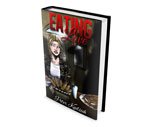
First and foremost, you must align yourself with the truth. This is the primary prerequisite to emotional growth because without that you’re like a fly repeatedly beating its head into a window – going nowhere while wasting vast amounts of energy and time. [For more information on this see the post on maturity]
An Expanded You
Carl Jung once said that you don’t get rid of your emotional problems, you simply out-grow them. That’s the basic idea of emotional growth. To be able to expand yourself, your awareness and the way you see things so that the world (and yourself) seem different. Not in a manipulative way, remember the first paragraph above, but in a way that allows you to see things more clearly and from a different perspective.
To do this you need the following:
1- ACCEPTANCE & RESPONSIBILITY
Acceptance in this case means seeing yourself and your life the way it is, and not the way you are wishing it was. It means that you’ll have to stop being willfully blind to what you don’t like or don’t want to admit. For example, many people jump from diet to diet hoping that their problem will be solved with little effort or introspection on their part. They silence their inner, critical voices that tell them that most of the other diets they’ve tried have failed and that the dieting world is a marketing industry, existing to make money above all else. This way it is so much easier to blame the “scammers” and forgo the responsibility of putting in just a little bit of effort which nobody wants to do because, well, it’s effort and then they’ll also have to accept that they can’t eat the way they want to anymore. For emotional eaters, they’ll have to first accept that they have an eating issue and then accept that they have an uncomfortable and dark underworld of emotional pain to deal with. Not easy.
2- EMOTIONAL TOLERANCE
Once a person has accepted a certain reality about their life they then need to muster up the resources to be able to tolerate the new world they now inhabit. Often that can involve lots of grieving and sadness as people start to let go of what they held onto for so long: their parents unconditional love, the belief that their spouse loves them, the idea that they can pursue a certain career path or the hope that the wishes and dreams they had while they were young adults are still within reach. When you learn to tolerate these previously repressed feelings you grow, which means you allow room for them and in doing so they feel uncomfortable but this discomfort is LESS than the discomfort of shoving the feelings down into your unconscious. Repressing them takes a lot of energy and is draining, resulting in a whole new layer of symptoms.
3- NEW INFORMATION & READING BOOKS
A big part of emotional growth is seeing yourself and the world from a new perspective and you can’t do that unless you gather and take in new data on a regular basis. Three great ways to do this are:
a) Therapy – When you go to therapy what you’re doing is paying someone to provide a safe space to allow you to open up and put your personal perspective on display between the two of you. The therapist, who has studied and become proficient in their practice, sees things differently and tries to help you do the same, by gently nudging you towards certain truths and by bringing out emotional responses that you either can’t bear, or have a hard time accessing.
After a few sessions you start to see patterns of behavior in yourself that are so obvious you wondered how you never noticed before. You see why you repeated other behaviors compulsively even though a part of you knew they wouldn’t do you any good. A lot of good can come from therapy if you walk in with the intention of WANTING to explore and know more about your inner world, and, if you are willing to work on yourself between sessions.
b) Paying Attention – Another great way of gathering new information is by paying attention to yourself. Start to notice what your emotional reactions and judgemental thoughts are to certain movie scenes, general stressors and interactions you have with other people. Most of your inner thoughts are automatic and barely conscious. You register just enough to know you either feel positive or negative about it and then it’s gone as you move onto the next thought or chase the next experience that will increase your serotonin level (which is not necessarily a bad thing).

c) Books – When you are reading quality books, you are accessing the decades of knowledge that that person has accumulated and which you can have for a paltry $10 and couple of hours of your time. Again, as long as it is a book that has real, useful information in it, you are getting a bargain of a lifetime.
Unlike novels, the best way to read informational books is slowly and repeatedly. You want to be able to digest the ideas and incorporate them, so that you now have more tools at your disposal and can analyze your own world with more depth and accuracy.
Then, in a few months you’ll want to read them again. Because if you’ve continued to work on yourself in that time (other books, therapy and introspection), you’ll be a new person to some degree and can read the same words but get something new or more out of them. You will also be able to grasp and “get” things you couldn’t the first time around because you are now coming from a more learned place with a new ability to absorb material on this subject.
Then rinse and repeat; read newer books, some older ones again, then more newer ones discarding what wasn’t helpful and keeping for re-reading what was.
Perspective
All of this is to enable you to get a new perspective and when you do that you grow because when you see the world differently, things that used to bother you become less irksome and you start to live from a more calm and centered place.
Like the woman in the image at the top of this blog post, we like to get new perspectives, especially in nature. When we visit mountains or canyons or the ocean we are experiencing ourselves as TINY and the world as VAST and that allows us to see that our focus in our day to day life is stressful because it is too narrow. Looking out into this vast mystery we see that our frustration at having to wait an extra 15 minutes at the dentist’s office probably wasn’t that big of a deal, and so wasn’t worth the stress we experienced.
…

THE EATING LOVE GUIDE (FREE)
The Eating Love Guide has helped many people regain control of their eating patterns, resulting not only in weight loss but also better health and improved self-esteem. To read it online, click here.

SUBMIT A POST!
To post your cheat meal, click here. To share your tips, wisdom and/or emotional journey, click here.


